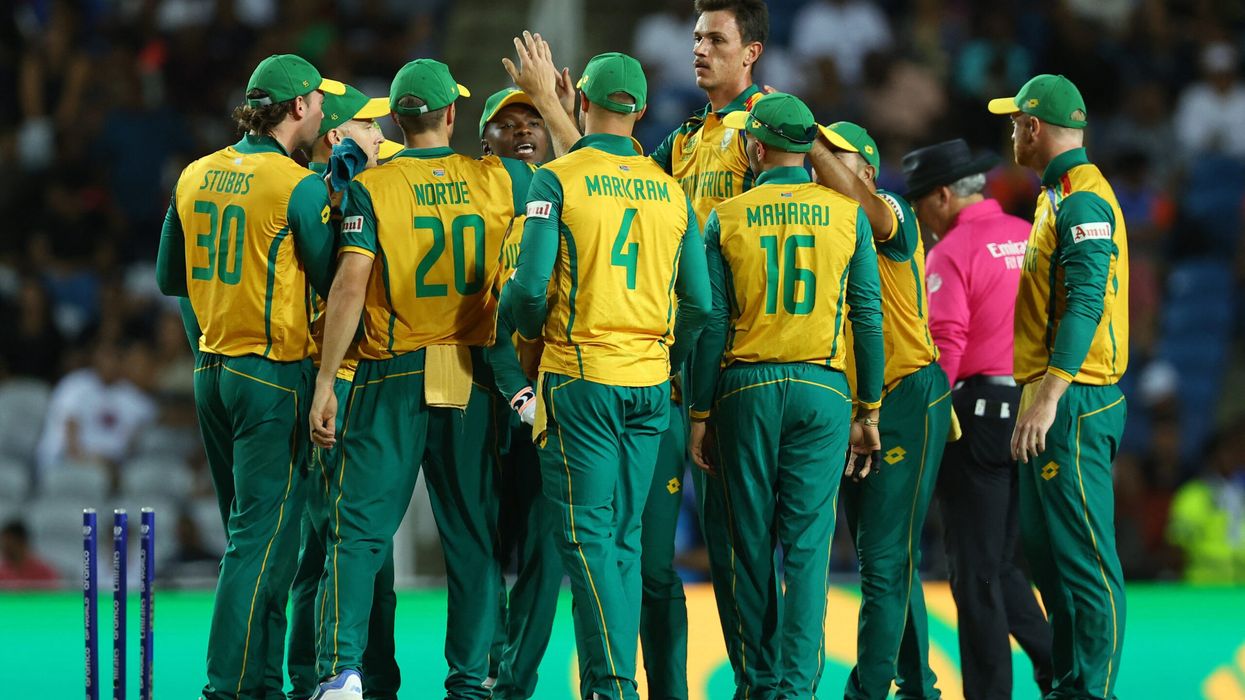A clinical South Africa skittled Afghanistan for 56 on their way to a comprehensive nine-wicket victory in the first Twenty20 World Cup semi-final in Trinidad, sending the Proteas into their first ever final.
It was a first victory in eight short-format World Cup semi-finals going back to 1992 for South Africa, who will now take on the winner of Thursday's (27) second semi-final between India and holders England for the title in Barbados on Saturday (29).
The perennial underachievers looked anything but as they ripped through the Afghan batting in less than 12 overs at Brian Lara Stadium to restrict their shell shocked opponents to their lowest ever score in T20 internationals.
South Africa's batting has stuttered at times during the tournament and Fazalhaq Farooqi bowled Quinton de Kock early, but Reeza Hendricks and skipper Aiden Markram got the Proteas to their target without further losses inside nine overs.
"Really chuffed for us to have one more crack at lifting a trophy," Markram said.
"A lot of our games have been really close and I know there's a lot of people back at home in the early hours of the morning waking up, and we've given them a lot of grey hairs.
"So hopefully this evening was a little bit more comforting for them."
Afghanistan, playing their first semi-final after a thrilling victory over Bangladesh in their last Super Eight match in St Vincent on Monday (24), won the toss and chose to bat.
Rahmanullah Gurbaz, the highest run-scorer at the tournament, and Ibrahim Zadran had been the mainstay of the Afghan batting with three century opening partnerships on their fairytale run to the last four.
Left-arm quick Marco Jansen (3-16) removed Gurbaz for a duck with just four runs on the board in the opening over, however, and returned in the third over to bowl Gulbadin Naib for nine.
There was no respite from the other end as paceman Kagiso Rabada (2-14) found a nice line and length to bowl Zadran and Mohammad Nabi for a couple of runs apiece in the fourth over.
The third quick Anrich Nortje (2-7) chipped in with a couple of wickets and left-arm wrist spinner Tabraiz Shamsi (3-6) mopped up the tail as Afghanistan became the first team to score fewer than 100 runs in a T20 World Cup semi-final.
Afghanistan have been rewarded at this tournament for never giving up however bleak their prospects and their bowlers made it clear that the South African batsmen would have to earn their place in the final.
The tournament's leading wicket taker, left-arm seamer Fazalhaq Farooqi, made de Kock his 17th victim by swinging a ball in at the opener and shattering his stumps in the second over.
Hendricks (29 not out) and Markram (23 not out), though, were happy to play through dot balls and await their chances to score as they inched towards their modest target.
Opener Hendricks got them across the line with a six off a free hit and a four in successive balls to extend South Africa's winning streak at the tournament to eight matches.
It was a disappointing end to a dream tournament for Afghanistan captain Rashid Khan, who led his team to wins over New Zealand and Australia on their way to the semi-finals.
"It was a tough, tough night for us as a team ... they bowled exceptionally well," he said. "I think at the start of the tournament if you had said we would reach the semi-finals and play one of the best teams, we would have accepted that.
"It's just the beginning for us. We've got that kind of confidence we want, and the belief that we can beat any side on a day."
(Reuters)





